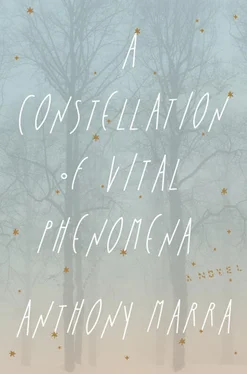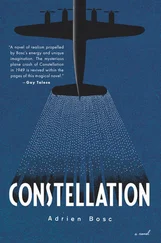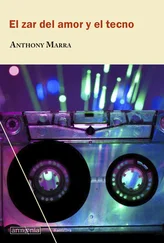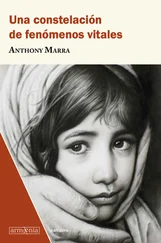“You have stalkers? No wonder you didn’t have time to write about the Russians.”
“That’s a story for another day.” He glanced back to the newborn. “Let’s introduce ourselves.”
The father and the historian embraced, all gratitude and congratulations silently locked between their arms. The father lifted the girl from the mother. His long fingers held her.
“What will you call her?” Natasha asked.
“Havaa,” the father said. “Havaa.”

HAVAA’S FATHER NEVER again played chess after returning from the final trip to the mountains with Ramzan in January 2003. He spent his days caught like a coin between the divan cushions. Sweat seeped into his shirt collar, leaving a rim the color of crushed mustard seed. His fingers had, well, healed wasn’t the right word. The stumps had hardened into pink lumps rising from the webs of his palms. He struggled to button his shirt, open the door, eat, tie his shoes, and Havaa, insistent and unrelenting, became his hands.
The heat of the following summer weighed so much it would take an extra autumn to fully lift. Her mother kept her waistline hidden beneath wide skirts and aprons, refusing to wear maternity clothes. She still slept in her parents’ bedroom on a mattress so thin she felt the pattern of nail heads in the floor. Refugees still arrived, still overdressed and bewildered, and her father still took them in.
That summer the leaves drooped in the heat. Decay baked at her feet and in it crawled little insects that made homes in her boot prints. She hiked as if the forest were a fragile thing, careful to sidestep saplings so slender they bowed with the breeze. Her father told her that Soviet timber interests had controlled the forest before the wars, but she couldn’t find a tree stump on her side of the forest, and rust-chewed saw belts, buried like relics of a prior civilization, were the only evidence of past industry.
Flocks of migrating birds clutched shaded branches. Lizards hid in dewy deer tracks. Once, she saw a wolf slaloming between the birch trunks; its pink tongue lolled from its open mouth and the sunlight glimmered on its fangs. When the wolf spotted her, half hidden behind a hornbeam, its ears snapped skyward. It found her eyes amid the leaves and studied them, questioningly, and she stared back, unnerved but not quite afraid, until they came to an understanding, and the wolf continued its saunter through the long, lovely shadows. Despite her sprinting pulse, she had only pity for the wolf, sweltering, as it was, under that heavy silver coat.
She visited Akim often that summer. His portrait survived the February frosts and March thaws, but even the varnish, smeared like sunblock across his cheeks, couldn’t save him from the summer heat. His face slumped and faded. How the summer aged him. In life he had preferred the cold and dreamed of visiting the North Pole. In eighteen years his oldest brother, a geologist, would bury what remained of Akim’s portrait in Arctic snow, not quite at the North Pole, but close enough to make a compass needle spin in circles.
The sight of Akim’s half-erased face left Havaa crestfallen, but an hour’s trek from the village, she found the solution guarding a fallow field. The scarecrow wore a burlap sack and sun-bleached blue trousers, its straw-stuffed waist wider than that of any villager. A faceless cloth crammed with dead leaves sat where the head should be. Crows perched on its brim and mice nested in the sags of its shirtsleeves. Her parents warned her against venturing into the fields, but the chance to extend Akim’s life, once again, outweighed her fear. Each step planted with cautious deliberation, she reached the scarecrow. A wooden post, rooted in the soil, impaled the limp straw body. She kicked the post, then excavated its base. The dirt scratched her knees and she scratched the dirt back. The scarecrow tilted with the post, arms and legs hanging back like a refugee collapsing into bed. Mice scurried from the sleeves when they at last brushed the ground. The whole glaring sky focused on her as she tied a rag around the splintered post end, gripped, and pulled. The scarecrow’s head nodded as it fell along the furrows. His arms stretched across the dry soil as if searching for mines.
It took three afternoons before she joined the straw body to Akim’s head. When the sun set on the first evening, she left the scarecrow to sleep in the driest part of a roadside ditch. The next evening she hid him in the shadow of a fallen tree. Finally, she had the wilted torso leaning against the tree, and taking gardening shears by their blue rubber handles, she decapitated the faceless cloth head with a few rusty snaps. She dug a small hole, slid the post in, and the scarecrow stood. Browned straw jutted from the scarecrow’s neck, bearding Akim, but another few clips shaved him. Though the scarecrow looked better, it was still no more than a lax, lifeless body propped up beneath a fading portrait, requiring resuscitation. She snipped her hair with the gardening shears and pasted the clippings on Akim’s crown. She pricked her finger with a sewing needle and rubbed her warm blood onto Akim’s cheeks. Reenacting Akhmed’s movements, she thumped on the scarecrow’s chest, as he had thumped on the boy’s chest, and when the breath of life erupted — her own — she stood back and wiped the sweat-sting from her eyes. The air was clean. Her hands brown with dirt. Pride surged through her, raw and immense; she had believed happiness to be an absence — of fear, of pain, of grief — but here it roared in her as powerful as any sadness. She looked at her fingers and loved them. They had carried the scarecrow for three kilometers of field, road, and forest without setting off a single mine. They had saved Akim for a second time.
As the summer burned on she would lie on her back and describe to Akim the shapes of clouds spotted through breaks in the trees. She would lie on her stomach and report the gross and fascinating news from the insect world. She would complain about her mother and father, how the Landfill had changed them both and how the dry evening air combusted without refugees to douse the tension. Silence, she had learned, was safer than questions. Even as her mother’s belly grew, Havaa kept her questions and comments for Akim, who, in death, treated her more graciously than he ever had in life.
Havaa was sitting beside Akim when she heard her mother’s screams, first mistaking them for the breeze through thicket, but the air lay thick and still, and wind couldn’t call for help. She ran home. Her mother lay on the floor beneath a blood-soaked apron. Her father and Akhmed knelt beside her. “She’s hemorrhaging,” Akhmed was saying. “I don’t know what to do. We need to get her to the hospital.” She waited with her father while Akhmed hurtled toward Ramzan’s for his truck. In a shuddering voice her father kept asking the pale-faced woman — who looked like her mother and wore her mother’s apron but couldn’t be her mother — for forgiveness. If she had been dying every minute of every day, they might have been a happy family. The blood consumed every centimeter of apron cloth and Havaa was afraid the wound would become hers if she came too close. Her mother stirred, looked to her father, and wrapped her five fingers over his none. She opened her mouth, but he shook his head, told her to save her breath, and Havaa would always remember how he had shushed what might have been her good-bye so that she could breathe.
The splatter of gravel outside and Akhmed ran in, now in the living room, now kneeling on the floor, now lifting the head of the woman who would not be, could not be, but was her mother. Her father tried to help but he couldn’t even lift the hair from her eyes. They left Havaa at the house with instructions shouted from the open passenger window and swallowed by the road before she could ask for clarification. The road distended, becoming a cloud the truck fell into. She asked Allah to save her mother, and, as her prayer vanished in dust, wondered if she should ask again in Arabic.
Читать дальше












